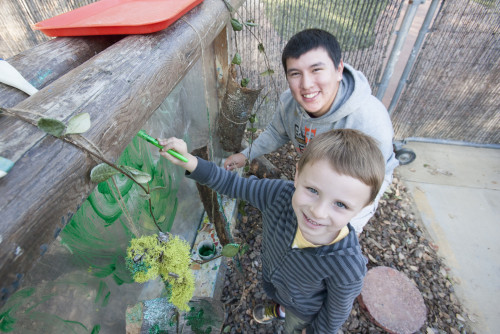Early Childhood Education AS-T Degree
Provides students with a common core of lower division courses required to transfer and pursue a bachelor’s degree in Child Development or Early Childhood Education in the CSU System.
Associate in Science for Transfer | SC Program: AS-T.1002
The Early Childhood Education (ECE) program includes many different job opportunities related to direct work with young children. Students pursing this major should enjoy interacting with children and have a strong desire to help them learn and succeed.
The Associate in Science in Early Childhood Education Transfer degree is designed to provide students with a common core of eight early childhood education courses (approved by the Curriculum Alignment Project) that permit students to transfer smoothly to participating CSU’s to complete a Bachelor’s degree in child development or early childhood education.
The degree is designed to facilitate students’ successful transfer to certain California State University (CSU) campuses that prepare them for advanced study in a variety of graduate programs, as well as a variety of careers such as teaching, Child Development Specialist, Program Directors, and Child Life Specialists. With a BA in ECE/Child Development, students are eligible for the Master Teacher and Site Supervisor levels of the CA Child Development Permit, using the Alternative Qualifications category.



Choose your path
Map your education by viewing the program map for the degree or certificate you’re interested in earning below. Meet with a counselor to create your official comprehensive education plan.
A program map shows all the required and recommended courses you need to graduate and a suggested order in which you should take them. The suggested sequence of courses is based on enrollment and includes all major and general education courses required for the degree.
Fall Semester, First Year
16 Units TotalIn this course, students receive instruction in academic reading and writing, including writing processes, effective use of language, analytical thinking, and the foundations of academic research. An argumentative research essay is required for the successful completion of the course. This course may be offered in a distance education format.
This course is an introduction to government and politics in the United States and California. Students examine the constitutions, structure, and operation of governing institutions, civil liberties and civil rights, political behaviors, political issues, and public policy using political science theory and methodology. This course may be offered in a distance education format.
Spring Semester, First Year
16 Units TotalThis is a survey course designed for non-science majors. It spans the Earth-related sciences, including geology, oceanography, meteorology, and astronomy. In general, the course focuses on physical processes and materials as related to each discipline. Topics include the geologic evolution of the Earth, economic resources derived from the Earth, Earth materials, evolution and character of the oceans, ocean-atmosphere interactions, atmospheric processes including weather and climate, the solar system and Earth as part of the universe. Using an Earth systems approach, lecture and laboratory will consider concepts centered on the sustainable use of natural resources. The laboratory portion of this course provides hands-on activities that support and demonstrate lecture concepts. This course may be offered in a distance education format.
Fall Semester, Second Year
15 Units TotalThis course is a survey of the history of the United States from Pre-Columbian Peoples to the end of Reconstruction. Topics include contact and settlement of America, the movement toward independence, the formation of a new nation and Constitution, westward expansion and manifest destiny, the causes and consequences of the Civil War, and Reconstruction. This course satisfies the CSU requirement for US History (US-1). This course may be offered in a distance education format.
This course is an introduction to the major concepts of modern biology. Topics covered include biochemistry, cell biology, heredity, and nature of genes, evolution, diversity of life, and principles of ecology. Emphasis will be placed on those aspects of biology that are rapidly reshaping our culture. This course may be offered in a distance education format. This course will meet the general education requirement for a laboratory science if taken with BIOL 10L.
Spring Semester, Second Year
13 Units TotalThis course takes an interdisciplinary approach to the study of race and ethnicity in the United States. It examines social justice movements in relation to ethnic and racial groups in the United States to provide a basis for a better understanding of the socioeconomic, cultural, and political conditions among key social groups including, but not limited to, Native Americans, African Americans, Asian Americans, and Latina/o Americans. This course examines the systemic nature of racial/ethnic oppression through an examination of key concepts including racialization and ethnocentrism, with a specific focus on the persistence of white supremacy. Using an anti-racist framework, the course will examine historical and contemporary social movements dedicated to the decolonization of social institutions, resistance, and social justice. This course may be offered in a distance education format.
This capstone course focuses on identifying, developing, and refining skills and behaviors essential for effective teaching of young children, consistent with national standards. The course is intended for students who want or need a supervised field experience where they have the opportunity to work directly with children to integrate theory and practice. Students will have the opportunity to practice and demonstrate skills that focus on child-centered, play-based approaches to teaching by designing, implementing, and evaluating developmentally appropriate activities, as well as gaining practical knowledge of learning and assessment. Knowledge of curriculum design will be emphasized as students plan, prepare, present, and evaluate experiences that promote positive development. The lecture component of this course may be offered in a distance education format. This course includes 54 hours of participation with young children in the Shasta College ECE Center Lab School or in a certified early childhood Mentor classroom.
Deprecated: str_replace(): Passing null to parameter #3 ($subject) of type array|string is deprecated in /var/www/html/templates/callouts/program-map.php on line 241
Please see a counselor to discuss options for meeting general education requirements for transfer to California State Universities (CSU) and/or University of California (UC) campuses, as well as any specific additional courses that may be required by your chosen institution of transfer.
*Alternative Courses: Please see a Shasta College counselor for alternative course options. You can also view the following to find other courses to meet degree/certificate requirements:
- California State Universities – General Education
- IGETC – Intersegmental General Education Transfer Curriculum
Contact Us for More Information
Counseling & Student Services
Contact InfoAcademic/Instructional Division Office
Start Your Future at Shasta College
We are dedicated to helping you reach your educational and career goals. To begin your journey, apply for admissions today!
